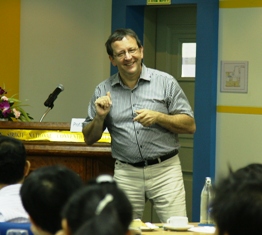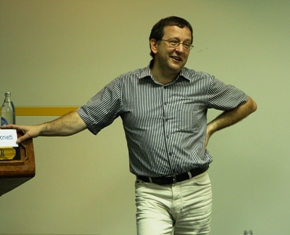
“Think negative!” said Prof. Dr. Markus ANTONIETTI, Director of Max Planck Institute of Colloids and Interfaces, Germany, referring to the use of carbon negative in his talk on “Hydrothermal carbonization of Biomass: The concept of sustainable, carbon negative, high end carbon materials” at NANOTEC on November 29. The talk focused on the process and a variety of the potential products generated, such as soil conditioner, battery electrode materials, porous sorption coals, ion exchange resins, or selective sorbents for CO2 separation. In addition, the talk also tries to give some potential and scale of such type of technology.
Energy shortage, environmental crisis, and developing customer demands have driven people to find facile, low-cost, environmentally friendly, and nontoxic routes to produce novel functional materials that can be commercialized in the near future. Hydrothermal carbonization (HTC) process of biomass (either of isolated carbohydrates or crude plants) is a promising candidate for the synthesis of novel carbon-based materials with a wide variety of potential applications.
“From a chemist point of view, we really need CO2–negative technology and products if we are to address the CO2 problem” said Prof. Dr. Markus. “Biomass is already in existence in farming cycles, so turning this biomass into monomers, polymers, and carbonaceous materials would help enhance soil fertility and biological amplification”.
Prof. Dr. Markus said that Thailand would be a good example of a country that would greatly benefit from HTC since it would help replenish nutrients to the valuable agricultural soil for years to come.


